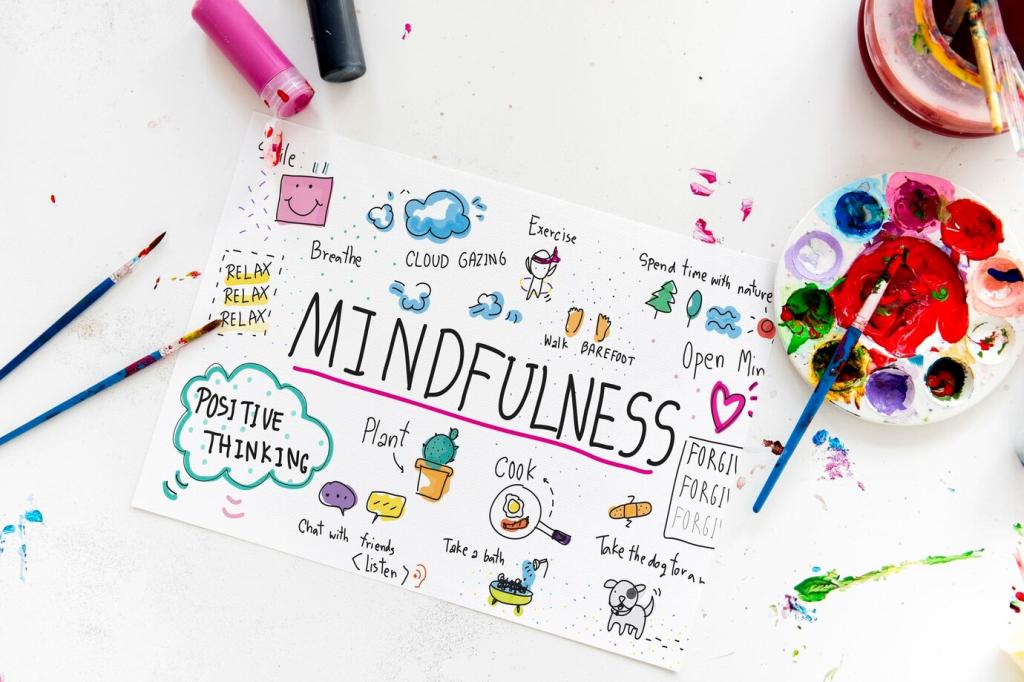
Mindful Living Strategies for Personal Growth
Mindful living is a conscious approach to existence that fosters personal growth by cultivating awareness, presence, and intentional action. By integrating mindfulness into daily routines, individuals can unlock their fullest potential and create a life grounded in clarity, resilience, and genuine well-being. Embracing mindful living not only enhances self-awareness but also paves the way for deeper connections, reduced stress, and a renewed sense of purpose on the path to personal transformation.
Practicing Mindful Breathing
Mindful breathing is a powerful tool to anchor the mind in the present moment. By paying close attention to each inhale and exhale, you train your focus away from distractions and rumination. This simple yet profound practice calms the nervous system and promotes relaxation. Over time, regular mindful breathing can enhance concentration and reduce anxiety by reinforcing the mind’s ability to return to the present whenever it wanders. The act of noticing your breath also serves as a gentle reminder that every moment offers an opportunity to start anew.
Observing Thoughts Nonjudgmentally
When practicing present-moment awareness, it’s natural for thoughts to arise. Rather than resisting or analyzing them, mindful living encourages observing thoughts without judgment. This approach allows you to notice your mental patterns and emotional responses, making it easier to distance yourself from unhelpful narratives. By observing without attaching meaning or criticism, you develop compassion for yourself and build a foundation for intentional change. This skill is crucial for personal growth, as it promotes a healthy relationship with your inner world.
Engaging the Senses Fully
Tuning into your senses anchors you to the present and enriches everyday experiences. By consciously focusing on sounds, sights, smells, textures, or tastes, you create space to appreciate the richness of each moment. Engaging your senses prevents the mind from getting stuck in worries about the past or future, fostering gratitude and joy. This sensory awareness can transform mundane activities into opportunities for mindfulness, supporting emotional balance and heightened awareness in daily life.
Identifying Emotional Triggers
Mindful living encourages you to pay attention to situations or interactions that provoke strong emotional reactions. By identifying these emotional triggers, you can create space between stimulus and response, allowing for thoughtful choices instead of reflexive reactions. Understanding your triggers helps you address underlying fears or unmet needs, empowering you to break old patterns and grow beyond habitual behaviors. This self-awareness ultimately translates to greater emotional freedom and personal development.
Practicing Self-Compassion
A critical aspect of emotional intelligence is the ability to extend kindness and understanding to oneself, especially during difficult moments. Mindful living teaches the importance of approaching your own struggles with compassion rather than criticism. By practicing self-compassion, you reduce self-judgment and create an inner environment conducive to growth. This nurturing attitude supports resilience, enhances well-being, and fosters a more positive outlook on personal challenges.
Enhancing Empathy Toward Others
Mindfulness deepens your capacity to empathize with the experiences of others. By being fully present and attentive in conversations, you naturally tune into the emotions and perspectives of people around you. Developing empathy not only strengthens relationships but also broadens your understanding of the world. This heightened compassion promotes harmonious interactions and encourages you to respond thoughtfully, fostering personal growth through meaningful connections.
Fostering Resilience and Stress-Reduction
Responding, Not Reacting
One hallmark of resilience is the ability to respond rather than react to challenging situations. Mindfulness creates a pause between impulse and action, offering the space to consider options and choose the most constructive path forward. By cultivating this skill, you learn to approach stressors with equanimity and poise, reducing the likelihood of rash decisions that might hinder your growth. Over time, you become more adaptable and better able to handle emotional turbulence.
Mindful Stress Management Techniques
Utilizing mindful techniques such as meditation, body scans, or gentle movement offers practical ways to alleviate stress and restore balance. These practices ground you in the present and help you detect signs of stress early, allowing for proactive management. Engaging in these techniques regularly invigorates both mind and body, supporting greater emotional stability and enhancing your overall capacity to navigate life’s pressures with composure.
Developing a Growth Mindset
A growth mindset is the belief that challenges are opportunities to learn and evolve rather than threats to avoid. Mindful living nurtures this perspective by encouraging curiosity and openness. When faced with stress or setbacks, you view them as natural parts of the journey rather than insurmountable obstacles. This approach fosters resilience, motivation, and a willingness to persist, driving consistent personal and professional development.

Journaling for Awareness
Maintaining a daily or weekly journal is a powerful strategy for deepening self-reflection. Through writing, you observe your thoughts, emotions, and reactions in an objective manner. Journaling creates space to process complex experiences, recognize growth, and set clear intentions. Reviewing past entries reveals progress and recurring themes, offering guidance for ongoing self-improvement and cultivating greater clarity about your personal journey.
Setting Intentional Goals
Mindful self-reflection naturally leads to the establishment of meaningful, intentional goals. Rather than chasing external benchmarks set by society, setting goals rooted in self-awareness empowers you to pursue what genuinely matters. These thoughtfully crafted intentions act as a compass, helping you align daily actions with your core values. As you strive toward these goals, you’re more likely to stay motivated, resilient, and fulfilled along the way.
Learning from Past Experiences
Mindful reflection extends to thoughtfully considering previous choices, achievements, and challenges. Examining your past with curiosity, rather than judgment, turns every experience into a lesson for future growth. Recognizing patterns and extracting meaning helps you avoid past pitfalls and reinforces successful strategies. This continuous learning fosters greater adaptability and an ever-deepening sense of wisdom on your path of personal evolution.
Nurturing Healthy Relationships
Active listening is a core component of mindful relationships. By giving others your full attention, maintaining eye contact, and withholding judgment or premature responses, conversations become more meaningful. This openness encourages mutual understanding and respect, reducing misunderstandings and conflicts. Actively listening demonstrates genuine care, which strengthens rapport and paves the way for collaborative, positive growth in every relationship.
Previous
Next
Previous slide
Next slide

Creating Mindful Daily Routines
Starting the Day with Intention
A mindful morning routine sets a positive tone for the entire day. Practices such as gentle stretching, meditation, or simply savoring your first cup of tea invite presence and clarity. Beginning your day intentionally allows you to ground yourself, clarify priorities, and approach upcoming tasks with greater peace and focus. This foundational ritual builds resilience and sharpens your ability to respond thoughtfully as the day unfolds.
Practicing Mindful Transitions
Throughout the day, we move between various roles and environments. Mindful transitions—brief pauses during which you collect your thoughts and reconnect with your breath—help you shift gears smoothly. These moments of awareness can mitigate stress, increase adaptability, and refresh your perspective. By intentionally marking these in-between periods, you remain present and engaged, rather than overwhelmed or scattered.
Evening Reflection Practices
Ending the day with mindful reflection fosters closure and growth. Taking a few moments to acknowledge your achievements, challenges, and learnings supports a sense of accomplishment and readiness for rest. Practices like gratitude journaling or meditation help quiet the mind, release tension, and prepare you for restorative sleep. These evening rituals reinforce the day’s mindful intentions and create a continuous cycle of self-awareness and renewal.
